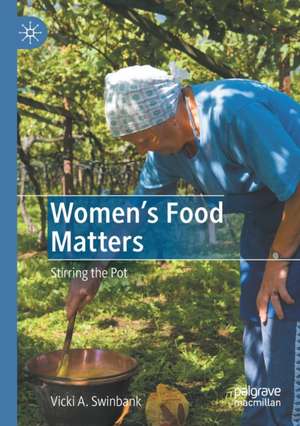Women's Food Matters: Stirring the Pot
Autor Vicki A. Swinbanken Limba Engleză Paperback – 17 apr 2022
| Toate formatele și edițiile | Preț | Express |
|---|---|---|
| Paperback (1) | 636.12 lei 6-8 săpt. | |
| Springer International Publishing – 17 apr 2022 | 636.12 lei 6-8 săpt. | |
| Hardback (1) | 641.38 lei 6-8 săpt. | |
| Springer International Publishing – 17 apr 2021 | 641.38 lei 6-8 săpt. |
Preț: 636.12 lei
Preț vechi: 748.38 lei
-15% Nou
Puncte Express: 954
Preț estimativ în valută:
121.72€ • 132.63$ • 102.57£
121.72€ • 132.63$ • 102.57£
Carte tipărită la comandă
Livrare economică 23 aprilie-07 mai
Preluare comenzi: 021 569.72.76
Specificații
ISBN-13: 9783030703981
ISBN-10: 3030703983
Pagini: 233
Ilustrații: XI, 233 p. 1 illus.
Dimensiuni: 148 x 210 x 19 mm
Greutate: 0.3 kg
Ediția:1st ed. 2021
Editura: Springer International Publishing
Colecția Palgrave Macmillan
Locul publicării:Cham, Switzerland
ISBN-10: 3030703983
Pagini: 233
Ilustrații: XI, 233 p. 1 illus.
Dimensiuni: 148 x 210 x 19 mm
Greutate: 0.3 kg
Ediția:1st ed. 2021
Editura: Springer International Publishing
Colecția Palgrave Macmillan
Locul publicării:Cham, Switzerland
Cuprins
Chapter 1: A brief feminist history of cooking.- Chapter2: ‘High’ and ‘low’ cuisine: the development of culinary hierarchy.- Chapter 3: A History of the Industrialisation of Food and Its Impact on Women.- Chapter 4: Threats to Biodiversity, Culinary Diversity and Food Sovereignty.- Chapter 5: Women feed the world: biodiversity and culinary diversity.- Chapter 6: Cooking as an Expression of Female Inter-Generational Food Culture.- Chapter 7: The Sexual Politics of Domestic Cooking.
Notă biografică
Vicki Swinbank is an Independent Researcher and Writer. She obtained a PhD in 2008 from the University of Melbourne, Australia. Her research interests focus on feminist politics and food issues. She has published on issues including food entitlement as a human right; the debate within feminism on vegetarianism; the sexual politics of cooking; and food and migrant identity.
Textul de pe ultima copertă
"This groundbreaking interdisciplinary feminist study offers a new perspective on how, and why, women’s food matters throughout history and in our contemporary world. As one of the first studies to combine a focus on food production, processing and cooking, on food cultures and food systems, Swinbank puts women’s knowledge and creativity at center stage in the reproduction and transformation of culture and agriculture. Women’s Food Matters provides a theoretically rich contribution."
David E. Sutton, Professor of Anthropology at Southern Illinois University
"Radical feminism has just taken its long-awaited seat at the food studies table. In Women’s Food Matters, Vicki Swinbank reminds us that women's inter-generational food knowledge—its production, preparation and consumption—is at the heart of most food cultures. Women’s Food Matters is consistently engaging, informative and persuasively argued, both taking us back to the wonderful memories of being in grandma’s kitchen, and into the diverse and widely-politicised world of the global food system."
Natalie Jovanovski, Lecturer and DECRA Research Fellow, The University of Melbourne, Australia
This book details how women have always been inextricably linked to food, especially in its production and preparation. This link, which applies cross-culturally, has seldom been fully acknowledged or celebrated. The role of women in this is usually taken for granted and therefore often rendered unimportant or invisible. This book presents a wide-ranging, interdisciplinary and comprehensive feminist analysis of women’s central role in many aspects of the world’s food systems and cultures. This central role is examined through a range of lenses, namely cross-cultural, intergenerational, and socially diverse.
This book will be of value to scholars in gender studies, sociology, anthropology, and food studies.
Vicki Swinbank is an independent researcher and writer. She obtained a PhD in 2008 from the University of Melbourne, Australia. Her research interests focus on feminist politics and food issues. She has published on issues including food entitlement as a human right; the debate within feminism on vegetarianism; the sexual politics of cooking; and food and migrant identity.
David E. Sutton, Professor of Anthropology at Southern Illinois University
"Radical feminism has just taken its long-awaited seat at the food studies table. In Women’s Food Matters, Vicki Swinbank reminds us that women's inter-generational food knowledge—its production, preparation and consumption—is at the heart of most food cultures. Women’s Food Matters is consistently engaging, informative and persuasively argued, both taking us back to the wonderful memories of being in grandma’s kitchen, and into the diverse and widely-politicised world of the global food system."
Natalie Jovanovski, Lecturer and DECRA Research Fellow, The University of Melbourne, Australia
This book details how women have always been inextricably linked to food, especially in its production and preparation. This link, which applies cross-culturally, has seldom been fully acknowledged or celebrated. The role of women in this is usually taken for granted and therefore often rendered unimportant or invisible. This book presents a wide-ranging, interdisciplinary and comprehensive feminist analysis of women’s central role in many aspects of the world’s food systems and cultures. This central role is examined through a range of lenses, namely cross-cultural, intergenerational, and socially diverse.
This book will be of value to scholars in gender studies, sociology, anthropology, and food studies.
Vicki Swinbank is an independent researcher and writer. She obtained a PhD in 2008 from the University of Melbourne, Australia. Her research interests focus on feminist politics and food issues. She has published on issues including food entitlement as a human right; the debate within feminism on vegetarianism; the sexual politics of cooking; and food and migrant identity.
Caracteristici
Focuses on the many positive aspects of women's relationship to food, including the rich history of women’s intergenerational food knowledge, and women’s central role in the development and maintenance of food systems and cultures Emphasises that women’s crucial role in developing and maintaining sustainable food systems has not been sufficiently recognized Acknowledges the central role of women in the development and preservation of food cultures
